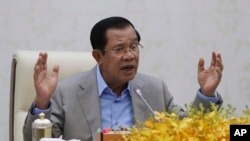Prime Minister Hun Sen on Tuesday strongly defended the draft “state of emergency” legislation and said that while it was very unlikely it would be enforced, it was prudent to pass the draft law if such a situation were to arise that would necessitate the extreme measure.
The newly-proposed law on declaring a national emergency would potentially give Cambodian government sweeping powers and unlimited access to martial power to enforce an emergency, while vastly controlling the citizenry’s online and offline activities.
The draft legislation would allow for the curtailment of civil rights and liberties, such as freedom of movement, expression, association, and assembly – all enshrined in the Cambodian Constitution – and widely criticized by rights groups.
In the press conference, Hun Sen said there was little chance, approximately “0.1 percent,” the law would be used in the current context but lashed out at criticism about the legislation’s ability to impinge on fundamental rights.
“Why Cambodia can’t make this law” he queried. “And [they] blame the [government] of taking the virus spread as an opportunity to enact the state of emergency law to silence people and [reduce] freedom of expression in the future.”
He added that in the case of a “rebellion” or “overthrow of the government,” authorities would crack down on those groups even without the “state of emergency” law. He added that draft law would likely be passed the National Assembly, which is filled with only Cambodian People’s Party lawmakers.
Prime Minister Hun Sen added that an emergency declaration would be made by the King. However, he said that the Constitutional Council of Cambodia would interpret whether an acting head of state could do the same.
The Constitution states the King can enforce a state of emergency after consulting with the executive and legislature, but in his absence the Senate President assumes the role of acting head of state though it is unclear if he or she assumes all the powers of the King.
The prime minister took umbrage to questions asked by VOA Khmer related to the other possibilities of declaring state of emergency besides virus outbreak, labeling the query as “proactive” and accusing the broadcaster of being ill-intentioned.
Taing Ratana, secretary-general at the Constitutional Council of Cambodia, said that he could not comment on the interpretation of the Constitution and draft law without an official request is made to the Constitutional Council to provide an explanation.
"I cannot reply unless the Constitutional Council responds when requested," he said.
The draft “state of emergency” law has received strong criticism from civil society members, human rights defenders, and politicians for the wide-ranging powers it gives to the government with nearly no serious accountability.
According to the draft law, allowing for a “state of emergency” to be declared in multiple scenarios, ranging from national security situations such as war or foreign invasion to public health concerns such as pandemics and severe calamity. It additionally allows for this law to be used during the vaguely-worded scenario of “severe chaos to national security and social order.”







